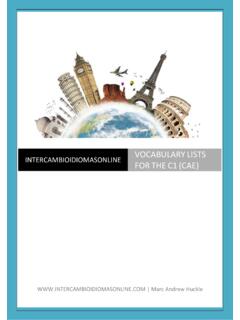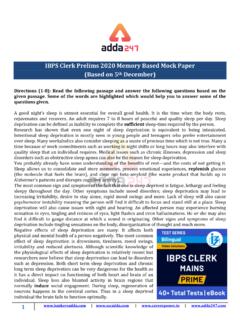Transcription of VOCABULARY LISTS FOR THE B2 (FCE/ISE II)
1 VOCABULARY LISTS . INTERCAMBIOIDIOMASONLINE FOR THE B2 (FCE/ISE. II). | Marc Andrew Huckle VOCABULARY ADVICE. The first thing you need to remember for the learning of VOCABULARY is our methodology: START. See it, say it and check pronunciation Try it in a context (translate it if you need to). Apply it and use it in phrases Review it and remember it Test it by using it in another context related to the exam What you need to do is make sure you start building your VOCABULARY in a logical way. 1. Start with your interests. You will use this VOCABULARY the most frequently and you need to know it well. 2. Do not learn individual words. You should learn new VOCABULARY as short phrases.
2 Only the new word should be new. LOOK AFTER =. Tomorrow I need to look after my kids. 3. Read a lot! 4. Watch TV in English with English subtitles and take notes. You should start watching programmes that you have already seen in your language. 5. Practice. You need to use language a lot. Try to think in English and review words frequently. Copyright MEMORIZATION TECHNIQUES. Learning new VOCABULARY can be one of the most difficult parts of language learning, but it does not need to be boring or time consuming. The most important thing is to do it regularly and do it in a way that you enjoy. The most important thing is consistency. By reviewing VOCABULARY for 30.
3 Minutes per day, you will advance very quickly. The important thing is to find the way you enjoy to learn and do this for long enough so that you notice the progress you have made. What you need to do is a mixture of activities that you find useful and interesting: 1. Write phrases (take new words and put them into contexts that you can remember easily). 2. Watch TV with subtitles and take notes 3. Create stories with new words so that you an retell the story and remember the words 4. Match new words with synonyms and similar words 5. Use images. Relate new words to images 6. Incorporate new words into your daily routine. Put post-it notes around the house etc.
4 7. Read all types of texts 8. Write all the time 9. Think in English. Think about words and topics frequently your own voice. Record yourself on your phone saying new words in phrases. Copyright B2 UNITS OF STUDY. The good part about the B2 exam is that the units of study are fixed. The difficult part is knowing all of the information in each part as there is no official VOCABULARY list. UNIT LEARNING TOPIC VOCABULARY . 1 Hobbies and free time Contextual, collocations, phrasal verbs, word patterns, idioms 2 Travel and getting around Contextual, collocations, phrasal verbs, word patterns, idioms 3 Education and learning styles Contextual, collocations, phrasal verbs, word patterns, idioms 4 Work and obligations Contextual, collocations, phrasal verbs, word patterns, idioms 5 Money and spending Contextual, collocations, phrasal verbs, word patterns, idioms 6 Time and how we use it Contextual, collocations, phrasal verbs, word patterns, idioms 7 Eating and drinking Contextual, collocations, phrasal verbs, word patterns.
5 Idioms 8 Health and fitness Contextual, collocations, phrasal verbs, word patterns, idioms 9 People and their lives Contextual, collocations, phrasal verbs, word patterns, idioms 10 Technological advances, Contextual, collocations, phrasal verbs, word patterns, communication and the media idioms 11 Wildlife and the environment Contextual, collocations, phrasal verbs, word patterns, idioms 12 Life, crime and society Contextual, collocations, phrasal verbs, word patterns, idioms 13 Design and creativity Contextual, collocations, phrasal verbs, word patterns, idioms 14 Happiness and relationships Contextual, collocations, phrasal verbs, work patterns, adjectives: ing vs ed, extreme adjectives, idioms *Time 150 hours/4 weeks (approx.)
6 Copyright VOCABULARY sheet - UNIT 1. Unit VOCABULARY Word Patterns Hate/loathe/detest/despise Be keen on, Be fond of, Be a fan of, Be big on Can t stand Be good/bad at Win/lose/draw Be interested in Beat Be crazy/mad about Score Be eager (infinitive). Like/love/enjoy Compete against Relax/rest Concentrate on Do/play (sport) Involve in Arrange/plan Listen to Arrive at/get to/reach Participate in Stay Join in Start/begin Go for a walk Garden (v, n) Can t help (ing) avoid Do DIY Do (general activities) do sport, do nothing Pub/bar/club/concert/festival Go + (ing). phrasal verbs Word formation Carry on continue Win winning, winner Get (a)round to start (after planning) Lose lost, losing, loss Get up to do sth/do sth you shouldn t Arrive arrival Go off stop liking Arrange arrangement Get into start liking Begin beginning Join in participate in Involve involvement Calm down - relax Join joint Put off delay Garden gardening Be into - like Concentrate concentration Put up with tolerate Compete competition Stand for tolerate/protect or defend Eager eagerly, eagerness Take up start doing Interest interested, interesting End up final result Take to become good at Hang out (with) spend time (with).
7 Call off - cancel Fixed phrases Idioms As well as Let off steam As long as Put your feet up I d rather + verb (do) Take five Regret (not) + ing Surf the internet Be worth + ing Be on the ball be on fire A part of Jump the gun jump ahead (precipitarse). STH = something SB = somebody Copyright VOCABULARY sheet - UNIT 2. Unit VOCABULARY Word patterns Book/reserve Be afraid/scared of Arrange/plan Be annoyed/angry with sb/about sth Miss/lose Arrange sth for sb Find/come across Be keen on Search/look for Regret (ing). Live/stay Dream of/about (ing). Arrive at/get to/reach Differ from sb Show Look for Know/meet/get to know Be used to (ing). Spend/take (time) Get used to (ing).
8 Feel like/fancy Used to ( verb ). Choose/pick/go for Pay for phrasal verbs Word formation Get/go away go on holiday/escape Book booked, booking Set off start a journey Reserve reservation Hold up delay Arrange arrangement Pick up collect Spend expensive Get around move from place to place Choose choice, choosy Drop off leave in a place Annoy annoyed, annoyance Get back return Differ (in)different, differently, difference Make for head in a direction Emigrate emigration Check in enter a hotel/flight Immigrate immigration, immigrant Check out leave a hotel Live live(s), life, lifestyle, lively Take off the plane leaves the ground Sightsee sightseeing Look around explore Sunbathe sunbathing Hurry up go faster Pay payment Check out look at sth Look forward to be excited about See off say goodbye at the airport etc.
9 Catch up with get to the same point as Fixed phrases Idioms Just in case Be down to earth humble/realistic In order to Go with the flow go along with anything In terms of Have itchy feet want to move Give consideration to Be a globetrotter be a traveller, enjoy travelling Keep in touch Be in the same boat be in the same situation Either way Dive (SB) up the wall annoy someone Every other way Take sth in one s stride accept sth for what sth On board is Copyright VOCABULARY sheet - UNIT 3. Unit VOCABULARY Word patterns Pass/fail/take/do (an exam) Learn about Achieve/get good grades Revise/study for Handle/cope with/deal with Boast of/about Revise/review/go over/cram Complain about Understand/take in/get Succeed in Teach/educate/learn Teach to sb/about sth Know/recognise Talk/speak to sb/about sth Degree/certificate/qualification/result/ grade/mark Be similar to Essay/writing Be suitable for Colleague/classmate Be interested in Task/activity Be happy with/about Objective/focus/goal Be capable of Speak/talk/discuss/chat/lecture/ Be able (infinitive).
10 Hope/wish/expect Consist of phrasal verbs Word formation Drop out (of) stop studying/going to school Revise revision Deal with handle/cope with Exam examination Get on with continue doing Hope hopeless, hopeful Think over consider Suit suitable, suitability Get at suggest Achieve achievement Catch on understand Succeed success, successful Go for choose Capable capability Be into like Consist consistent, consistency Find out discover information Fall behind not do sth fast enough Go over - review Go into begin to describe in detail Get away with not be caught or punished Make up invent information or a story Take down write down Take in understand Fixed phrases Idioms Make sense Hit the books study a lot Make up your mind Pull an all nighter Pay attention to Be on the mark be correct See no point in Cover all the bases be detailed Have (little/no) difficulty in Be ahead of the pack ahead of or better than On your own the rest of the people The benefit to/of With flying colours do something well Copyright VOCABULARY sheet - UNIT 4.








